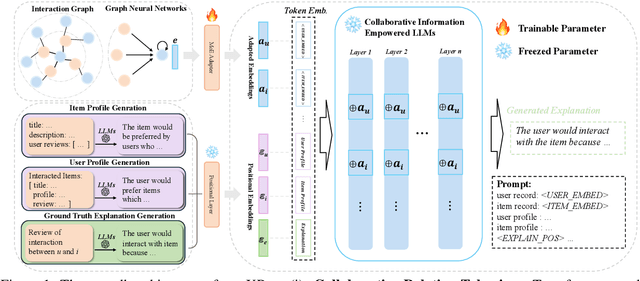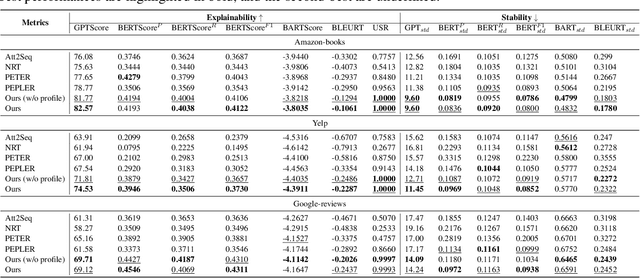Qiyao Ma
Learning More with Less: A Dynamic Dual-Level Down-Sampling Framework for Efficient Policy Optimization
Sep 26, 2025Abstract:Critic-free methods like GRPO reduce memory demands by estimating advantages from multiple rollouts but tend to converge slowly, as critical learning signals are diluted by an abundance of uninformative samples and tokens. To tackle this challenge, we propose the \textbf{Dynamic Dual-Level Down-Sampling (D$^3$S)} framework that prioritizes the most informative samples and tokens across groups to improve the efficient of policy optimization. D$^3$S operates along two levels: (1) the sample-level, which selects a subset of rollouts to maximize advantage variance ($\text{Var}(A)$). We theoretically proven that this selection is positively correlated with the upper bound of the policy gradient norms, yielding higher policy gradients. (2) the token-level, which prioritizes tokens with a high product of advantage magnitude and policy entropy ($|A_{i,t}|\times H_{i,t}$), focusing updates on tokens where the policy is both uncertain and impactful. Moreover, to prevent overfitting to high-signal data, D$^3$S employs a dynamic down-sampling schedule inspired by curriculum learning. This schedule starts with aggressive down-sampling to accelerate early learning and gradually relaxes to promote robust generalization. Extensive experiments on Qwen2.5 and Llama3.1 demonstrate that integrating D$^3$S into advanced RL algorithms achieves state-of-the-art performance and generalization while requiring \textit{fewer} samples and tokens across diverse reasoning benchmarks. Our code is added in the supplementary materials and will be made publicly available.
Low-Rank Adaptation for Foundation Models: A Comprehensive Review
Dec 31, 2024Abstract:The rapid advancement of foundation modelslarge-scale neural networks trained on diverse, extensive datasetshas revolutionized artificial intelligence, enabling unprecedented advancements across domains such as natural language processing, computer vision, and scientific discovery. However, the substantial parameter count of these models, often reaching billions or trillions, poses significant challenges in adapting them to specific downstream tasks. Low-Rank Adaptation (LoRA) has emerged as a highly promising approach for mitigating these challenges, offering a parameter-efficient mechanism to fine-tune foundation models with minimal computational overhead. This survey provides the first comprehensive review of LoRA techniques beyond large Language Models to general foundation models, including recent techniques foundations, emerging frontiers and applications of low-rank adaptation across multiple domains. Finally, this survey discusses key challenges and future research directions in theoretical understanding, scalability, and robustness. This survey serves as a valuable resource for researchers and practitioners working with efficient foundation model adaptation.
HARec: Hyperbolic Graph-LLM Alignment for Exploration and Exploitation in Recommender Systems
Nov 21, 2024



Abstract:Modern recommendation systems often create information cocoons, limiting users' exposure to diverse content. To enhance user experience, a crucial challenge is developing systems that can balance content exploration and exploitation, allowing users to adjust their recommendation preferences. Intuitively, this balance can be achieved through a tree-structured representation, where depth search facilitates exploitation and breadth search enables exploration. However, current works face two challenges to achieve this target: (1) Euclidean methods fail to fully capture hierarchical structures and lack flexibility in balancing exploration-exploitation, while (2) hyperbolic approaches, despite better hierarchical modeling, suffer from insufficient semantic alignment due to their reliance on Euclidean text encoders. To address these challenges, we propose HARec, a hyperbolic representation learning framework that jointly aligns user-item collaborative information with textual descriptions in hyperbolic space. Our framework introduces two key technique novelty: (1) a hierarchical-aware graph-llm alignment mechanism that enables better hierarchical representation, and (2) a hyperbolic hierarchical tree structure that facilitates user-adjustable exploration-exploitation trade-offs. Extensive experiments demonstrate that HARec consistently outperforms both Euclidean and hyperbolic baselines, achieving up to 5.49% improvement in utility metrics and 11.39% increase in diversity metrics.
FedBChain: A Blockchain-enabled Federated Learning Framework for Improving DeepConvLSTM with Comparative Strategy Insights
Jul 31, 2024



Abstract:Recent research in the field of Human Activity Recognition has shown that an improvement in prediction performance can be achieved by reducing the number of LSTM layers. However, this kind of enhancement is only significant on monolithic architectures, and when it runs on large-scale distributed training, data security and privacy issues will be reconsidered, and its prediction performance is unknown. In this paper, we introduce a novel framework: FedBChain, which integrates the federated learning paradigm based on a modified DeepConvLSTM architecture with a single LSTM layer. This framework performs comparative tests of prediction performance on three different real-world datasets based on three different hidden layer units (128, 256, and 512) combined with five different federated learning strategies, respectively. The results show that our architecture has significant improvements in Precision, Recall and F1-score compared to the centralized training approach on all datasets with all hidden layer units for all strategies: FedAvg strategy improves on average by 4.54%, FedProx improves on average by 4.57%, FedTrimmedAvg improves on average by 4.35%, Krum improves by 4.18% on average, and FedAvgM improves by 4.46% on average. Based on our results, it can be seen that FedBChain not only improves in performance, but also guarantees the security and privacy of user data compared to centralized training methods during the training process. The code for our experiments is publicly available (https://github.com/Glen909/FedBChain).
XRec: Large Language Models for Explainable Recommendation
Jun 04, 2024



Abstract:Recommender systems help users navigate information overload by providing personalized recommendations aligned with their preferences. Collaborative Filtering (CF) is a widely adopted approach, but while advanced techniques like graph neural networks (GNNs) and self-supervised learning (SSL) have enhanced CF models for better user representations, they often lack the ability to provide explanations for the recommended items. Explainable recommendations aim to address this gap by offering transparency and insights into the recommendation decision-making process, enhancing users' understanding. This work leverages the language capabilities of Large Language Models (LLMs) to push the boundaries of explainable recommender systems. We introduce a model-agnostic framework called XRec, which enables LLMs to provide comprehensive explanations for user behaviors in recommender systems. By integrating collaborative signals and designing a lightweight collaborative adaptor, the framework empowers LLMs to understand complex patterns in user-item interactions and gain a deeper understanding of user preferences. Our extensive experiments demonstrate the effectiveness of XRec, showcasing its ability to generate comprehensive and meaningful explanations that outperform baseline approaches in explainable recommender systems. We open-source our model implementation at https://github.com/HKUDS/XRec.
 Add to Chrome
Add to Chrome Add to Firefox
Add to Firefox Add to Edge
Add to Edge